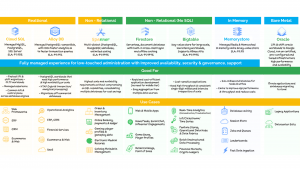In today’s data-driven world, businesses require robust and scalable database solutions to manage their ever-growing data. Google Cloud Platform (GCP) offers a robust suite of database solutions designed to meet various needs, from small projects to large-scale enterprise applications.
Each database model in Google Cloud is tailored for specific use cases, balancing cost-effectiveness with powerful features like serverless architectures. This approach, where Google Cloud manages the server infrastructure and scaling, is particularly beneficial for databases by simplifying operations, enhancing scalability, and improving fault tolerance, all without manual server management intervention.
In this blog post, we will explore the diverse range of databases available within Google Cloud, focusing on their unique capabilities and use cases across different categories: relational, in-memory, document, and key-value databases.
Why is this topic important?
Selecting the right database solution is pivotal for companies striving to thrive in the digital era. Efficient data management not only enhances application performance but also ensures seamless scalability to accommodate growing data volumes. Moreover, robust database solutions contribute to improved data security, compliance adherence, and overall operational efficiency. By understanding the features and benefits of different database models within GCP, businesses can make informed decisions that align with their specific requirements and long-term objectives.
The complexity of managing diverse data sets, ensuring high performance, maintaining scalability, and optimizing costs poses significant challenges for businesses. Traditional database solutions often struggle to keep pace with evolving demands, leading to performance bottlenecks, scalability issues, and inflated operational costs. Moreover, ensuring data security and compliance in an increasingly interconnected digital ecosystem presents additional challenges. GCP’s database solutions address these challenges by offering advanced features, seamless scalability, flexible pricing models, and robust security measures, empowering businesses to overcome obstacles and drive innovation.
Google Cloud Database Solutions: A spectrum of power and flexibility
GCP boasts a variety of database models, each catering to specific use cases. Whether you require the versatility of relational databases, the lightning-fast speed of in-memory solutions, or the scalability of NoSQL options, Google Cloud has you covered with four different types of database solutions -Relational, In-Memory, Document, and Key-Value- tailored for enhanced performance, scalability, cost efficiency, simplified management, and robust security.
From Memorystore’s fast speeds to Cloud Spanner’s global consistency, GCP ensures efficient application functionality and user experience. As data volumes grow, GCP databases seamlessly scale while offering flexible pricing to optimize costs. Fully managed services free development teams from infrastructure management, allowing focus on innovation, while robust security features prioritize data protection.
Relational Databases: Ensuring data integrity and simplifying complex queries for business applications
- Bare Metal Solution for Oracle
For users seeking minimal latency and optimal performance, GCP’s Bare Metal Solution is a standout choice. This setup is ideal for Oracle databases, providing direct access to hardware without the abstraction layers typical in virtualized environments. This results in reduced overhead and enhanced efficiency—key for applications demanding high-speed data processing.
- Cloud SQL: Fully Managed and Scalable
Cloud SQL caters to those needing a managed relational database with robust features. It supports seamless migrations, integrates flawlessly with other GCP services like GKE and GCE, and ensures data security through encryption both at rest and in transit. Its flexible pricing adapts to various organizational needs, making it a go-to for diverse applications.
- AlloyDB: The Popular Powerhouse
AlloyDB stands out in GCP’s portfolio as a highly popular choice, thanks to its advanced features over traditional PostgreSQL. This database supports massive scalability and high performance with its columnar data model and intelligent caching mechanisms. While AlloyDB’s cost might be higher, its capabilities justify the investment for enterprises requiring cutting-edge database technology.
- Cloud Spanner: Global Consistency Redefined
Unique among its peers, Cloud Spanner offers a globally distributed design while maintaining strong consistency and a near-perfect uptime SLA of 99.999%. This database is ideal for applications that require reliable, wide-reaching data access without compromising on performance.
In-Memory Database: Enabling real-time experiences and lightning-fast data retrieval for users
For applications requiring ultra-fast data access, Memorystore provides in-memory data storage with response times under a millisecond. Available in both basic and standard tiers, it offers configurations tailored to different reliability and performance needs, including fault recovery and scalable resources.
Document Database: Offering flexibility to store and manage evolving data structures for content-rich applications
Firestore excels in managing document-oriented data with ease. It offers real-time synchronization, offline access, and robust query capabilities, making it perfect for dynamic apps that need to stay updated continuously. Its serverless approach ensures developers can focus on building features without managing the underlying infrastructure.
Key-Value Database: High performance and scalability for frequently accessed data, enhancing responsiveness
When handling vast amounts of data with low latency, Cloud Bigtable is the solution. It supports extensive scalability and integrates seamlessly with the Hbase API, making it suitable for high-throughput applications such as real-time analytics and ad-tech.
Choosing the Right Database in Google Cloud Platform
The choice of a database in GCP largely depends on specific application needs and budget constraints. While AlloyDB currently stands as a popular choice due to its advanced features and broad adoption within Google’s services, each database model offers unique benefits. Understanding these options will help you select the most appropriate database solution, ensuring your applications run efficiently and cost-effectively.
Making Science: Your Trusted Guide in the GCP Database Landscape
Making Science has a wealth of knowledge and experience in navigating the world of GCP databases. Our team can assist you in assessing your needs, identifying the perfect database solution, and ensuring seamless integration within your GCP environment. Contact Making Science today and unlock the full potential of your data with the power of GCP’s database solutions!







 Cookie configuration
Cookie configuration